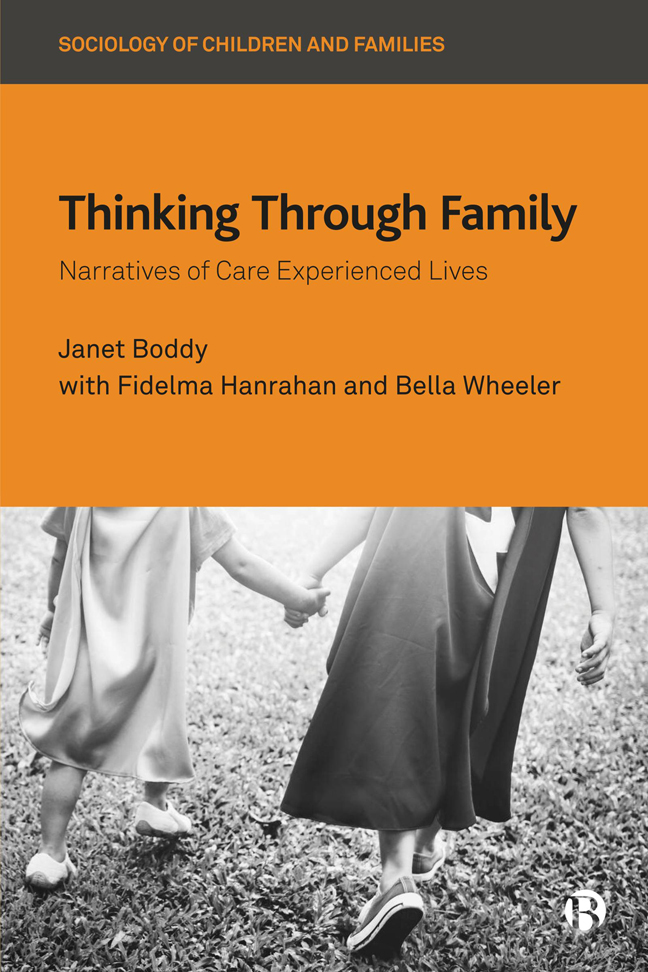Book contents
- Frontmatter
- Sensitive Content in this Book
- Dedication
- Miscellaneous Frontmatter
- Contents
- List of Figures and Table
- Acknowledgements
- 1 Why Think Through ‘Family’?
- 2 Learning From Care Experienced Perspectives
- 3 Doing Family: The Significance of the ‘Ordinary’
- 4 Re/Configuring Boundaries: Who Counts as ‘Family’?
- 5 ‘How Can We Not Talk about Family When Family's All That We’ve Got?’: Care and Connectedness
- 6 Understandings and Experiences of Parenthood
- 7 Thinking Through Family: Implications for Theory and Practice
- Notes
- References
- Index
1 - Why Think Through ‘Family’?
Published online by Cambridge University Press: 24 January 2024
- Frontmatter
- Sensitive Content in this Book
- Dedication
- Miscellaneous Frontmatter
- Contents
- List of Figures and Table
- Acknowledgements
- 1 Why Think Through ‘Family’?
- 2 Learning From Care Experienced Perspectives
- 3 Doing Family: The Significance of the ‘Ordinary’
- 4 Re/Configuring Boundaries: Who Counts as ‘Family’?
- 5 ‘How Can We Not Talk about Family When Family's All That We’ve Got?’: Care and Connectedness
- 6 Understandings and Experiences of Parenthood
- 7 Thinking Through Family: Implications for Theory and Practice
- Notes
- References
- Index
Summary
Create a single story, show a people as one thing, as only one thing, over and over again, and that is what they become. It is impossible to talk about the single story without talking about power. There is a word, an Igbo word, that I think about whenever I think about the power structures of the world, and it is ‘nkali’. It's a noun that loosely translates to ‘to be greater than another’. Like our economic and political worlds, stories too are defined by the principle of nkali. How they are told, who tells them, when they’re told, how many stories are told, are really dependent on power. Power is the ability not just to tell the story of another person, but to make it the definitive story of that person.
Chimamanda Ngozi Adichie, The Danger of a Single Story, 2009Introduction
This is a book about family, based on learning from the narratives of young adults who were in state care in childhood. By thinking through ‘family’ in care experienced lives, we aim to move beyond the pervasive story of the conventional family, building new insights into complex connected lives, identities and practices.
The book is based on two studies, both of which involved care experienced people living in England who were in early adulthood (all of whom were aged 16–30 years at the time of joining the research). These young adults are diverse, but they have in common that they spent time during childhood living apart from their birth parent/s: ‘looked after’ under English law, in court-ordered or voluntary arrangements that included residential care, foster care with unrelated families, kinship care with family or friends, and in some cases, legally permanent arrangements including adoption. As discussed in more detail in Chapter 2, these young adults are part of a diverse population, with varied experience in terms of reasons for entering the care system as well as the timing, nature and duration of their placements. But under English law – the Children Act 1989 – a common purpose for placement is clear: to safeguard or promote the child's welfare. As such, placing a child in care is an intervention that inevitably involves thinking about family.
Yet this is not primarily a book about public care: it is a book about family. There are two reasons for this.
- Type
- Chapter
- Information
- Thinking through FamilyNarratives of Care Experienced Lives, pp. 1 - 17Publisher: Bristol University PressPrint publication year: 2023

